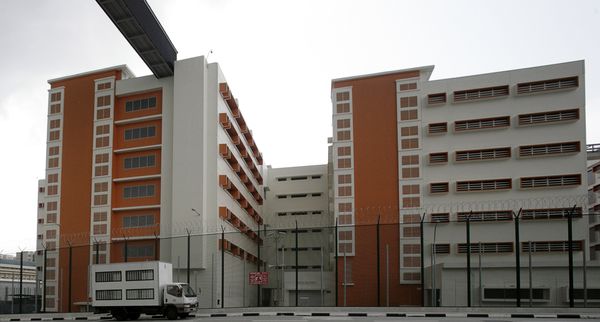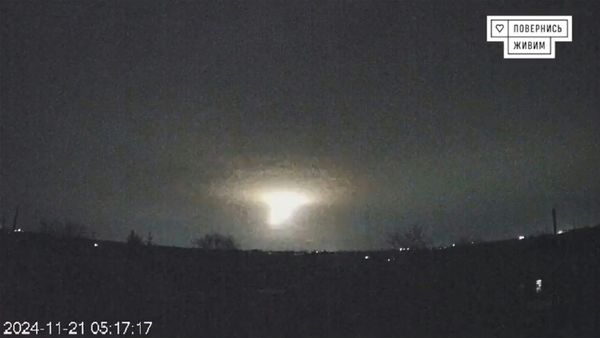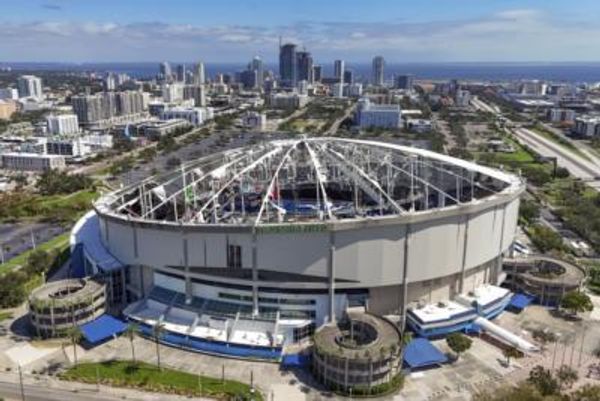
Russian forces have shelled the southern Ukrainian city of Nikopol, the latest in a series of bombardments of urban areas that has killed at least 37 people in the past three days and wounded scores.
Ukrainian emergency services said two people were wounded on Saturday and another two were trapped under rubble in Nikopol, which is on the Dnipro River.
Late on Friday, Russian missiles hit the city of Dnipro, about 120 kilometres north of Nikopol, killing three people and wounding 15, regional Governor Valentyn Reznychenko said on Telegram.
Rockets hit an industrial plant and a street next to it, he said.
A Russian strike hit the northeast Ukrainian town of Chuhuiv in Kharkiv region overnight, killing three people including a woman of 70, and wounding three more, the regional governor said.
The strike damaged a residential block, a school and a shop, and rescuers were going through the rubble, Governor Oleh Synehubov said on Telegram.
The attacks were the latest in a series of Russian hits in recent weeks using long-range missiles on crowded buildings in cities.
Eight people were killed and 13 injured in a string of shellings in 10 locations in the eastern region of Donetsk, Governor Pavlo Kyrylenko said in a television interview on Friday.
On Thursday, Kalibr cruise missiles launched from a Russian submarine in the Black Sea hit an office building in Vinnytsia, a city of 370,000 people about 200km southwest of Kyiv.
Kyiv said the strike killed at least 23 people and wounded dozens.
In Vinnytsia, residents placed teddy bears and flowers at a makeshift memorial to those killed.
Among the dead was Liza, a four-year-old girl with Down syndrome, found in the debris next to a pram. Images of her pushing the same pram, posted by her mother on a blog less than two hours before the attack, quickly went viral.
Her severely injured mother, Iryna Dmitrieva, was being kept in an information blackout at a hospital for fear that finding out about her daughter would kill her, doctors said.
“She is suffering from burns, chest injuries, abdominal injuries, liver and spleen injuries. We have stitched the organs together, the bones were crushed as if she went through a meat grinder,” said Oleksandr Fomin, chief doctor at the Vinnytsia Emergency Hospital. Were she told of her daughter’s death, “we would lose her”.
Russia’s defence ministry has said the strike on Vinnytsia was directed at a building where top officials from Ukraine’s armed forces were meeting foreign arms suppliers.
Russia has repeatedly denied targeting civilian areas, despite mounting evidence that its missiles have hit residential areas across the country.
The United Nations says thousands of civilians have been killed since Russia invaded Ukraine on February 24. Tens of thousands of combatants have also been killed.
Despite the bloodshed, both sides have described progress towards an agreement to lift a blockade restricting the export of Ukrainian grain. Mediator Turkey has said a deal could be signed next week.
Asked if that timeline was realistic, a senior Ukrainian official told Reuters: “We really hope so. We’re hurrying as fast as we can.” The official asked not to be identified.
Russia’s defence ministry said an agreement was close, but Moscow’s negotiator cautioned that a grains deal would not lead to a resumption of peace talks.
A deal would probably involve inspections of vessels to ensure Ukraine was not bringing in arms and guarantees from Western countries that Russia’s own food exports are exempt from sanctions.
The war has dominated a meeting of G20 finance ministers in Indonesia. Two sources said the group was unlikely to issue a formal communique on Saturday. Russia is a member, as are the G7 industrial powers, along with China, India and South Africa, among others.
Russia calls its intervention a “special military operation” to disarm Ukraine and root out nationalists. Kyiv and its allies call it an unprovoked attempt to reconquer a country which broke free of Moscow’s rule in 1991.







